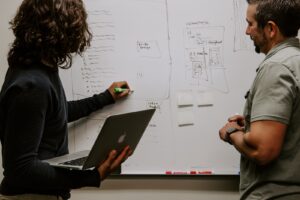Revolutionizing City Development with Cutting-Edge Digital Simulations
Digital Twin Technology in Urban Planning is redefining how cities like Dubai and Riyadh approach urban development. This innovative technology creates highly detailed digital models of physical cities, allowing planners and developers to simulate environments and predict outcomes without physical trials. This transformative approach not only enhances efficiency but also significantly reduces the costs and risks associated with urban development.
The Role of Digital Twins in Modern Urban Planning
Digital twin technology offers a revolutionary tool for city planners and developers by providing a dynamic platform to model urban landscapes in intricate detail. This technology assists cities in Saudi Arabia and the UAE to optimize their resources and manage their infrastructure more effectively. By simulating different scenarios, urban planners can anticipate problems and plan solutions proactively, thereby enhancing the livability and sustainability of rapidly growing urban areas like Riyadh and Dubai.
Integrating AI and IoT with Digital Twins
The power of digital twins is greatly enhanced by the integration of AI and IoT technologies. In smart cities, AI algorithms analyze data from IoT sensors embedded throughout the city to continuously update and refine the digital twins. This seamless integration allows for real-time monitoring and adjustment of scenarios, leading to more accurate predictions and efficient resource management. The adoption of these technologies in UAE and Saudi Arabia is setting a benchmark in how urban spaces are designed and operated.
Improving Urban Sustainability Through Advanced Simulations
Digital twin technology significantly contributes to the sustainability of urban environments by enabling the detailed simulation of energy systems, water networks, and waste management systems. For instance, Dubai’s smart city initiatives utilize digital twins to optimize energy consumption and reduce carbon footprints, making a substantial contribution to environmental sustainability efforts. This strategic application underscores the critical role of advanced simulations in building future-ready cities.
Blockchain for Enhanced Security in Digital Twin Applications
Incorporating Blockchain technology into digital twin applications offers enhanced security features critical for sensitive data involved in urban planning. The immutable nature of blockchain provides a secure platform for storing and processing large volumes of data generated by digital twins, ensuring that all information is protected against tampering and cyber threats. This integration is particularly beneficial in regions like Dubai and Riyadh, where urban planning data is pivotal for national development.
Leadership and Strategic Management in Digital Twin Projects
Successful implementation of digital twin technology in urban planning requires effective leadership and strategic project management. In the Middle East, executive coaching services are increasingly focused on preparing leaders to manage these complex projects. By enhancing their strategic decision-making and problem-solving skills, leaders are better equipped to oversee the development and deployment of digital twins in their cities, ensuring that these projects achieve their intended goals.
Challenges and Opportunities in Digital Twin Implementation
While the benefits of digital twin technology in urban planning are immense, the challenges it presents cannot be overlooked. Issues such as data privacy, high initial costs, and the need for sophisticated technical expertise are significant. However, the opportunities for innovation and improvement in urban management are substantial. Cities that successfully overcome these challenges, like Dubai and Riyadh, not only enhance their operational efficiencies but also improve the quality of life for their residents.
Enhancing Disaster Preparedness with Digital Twins
One of the critical applications of digital twin technology in urban planning is enhancing disaster preparedness. By creating accurate and dynamic models of cities, planners in Dubai and Riyadh can simulate various disaster scenarios and plan their responses accordingly. This capability allows for better preparedness and quicker response times in cases of natural disasters or other emergencies, potentially saving lives and reducing economic losses. The integration of digital twins into emergency management processes underscores their value in building resilient urban environments.
Streamlining Traffic and Infrastructure Management
Digital twins also play a pivotal role in optimizing traffic flow and infrastructure within cities. By using simulations to anticipate traffic patterns and test infrastructure projects before they are built, cities like Riyadh and Dubai can reduce congestion and improve mobility. This proactive approach to urban planning not only enhances the daily commute for millions of residents but also contributes to the overall sustainability of the city by reducing vehicle emissions and improving air quality.
Fostering Economic Growth and Innovation
Moreover, digital twin technology fosters economic growth and innovation in urban areas. By providing a risk-free environment to test new ideas, cities can experiment with innovative solutions to urban problems without the immediate financial or social costs of real-world implementation. This encourages a culture of innovation that can lead to significant advancements in urban planning and management, further boosting economic development in cities like Dubai and Riyadh that are already known for their futuristic landscapes.
#DigitalTwin, #UrbanPlanning, #SmartCities, #TechnologyInnovation, #Riyadh, #Dubai, #UAE, #SaudiArabia, #AI, #IoT, #Blockchain, #Leadership, #BusinessStrategy









